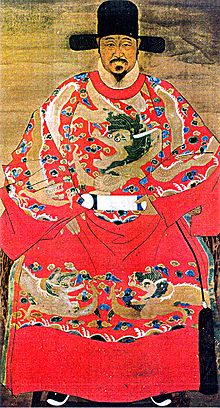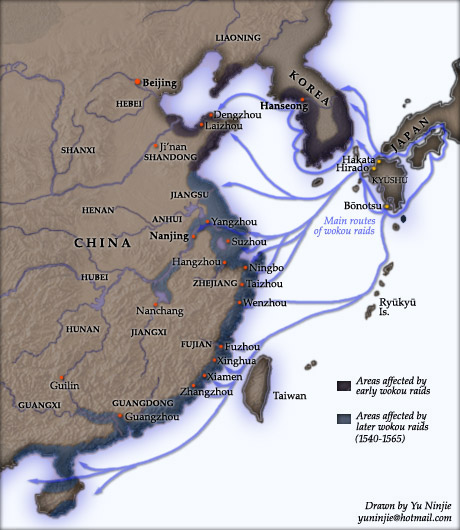<Back to Index>
- Botanist Anton Kerner von Marilaun, 1831
- Poet Juana Inés de Asbaje y Ramírez de Santillana, 1648
- General of the Ming Dynasty Qi Jiguang, 1528
PAGE SPONSOR


Qi Jiguang (November 12, 1528 – January 5, 1588) was a Chinese military general and national hero during the Ming Dynasty. He was best remembered for his courage and leadership in the fight against Japanese pirates along the east coast of China, as well as his reinforcement work on the Great Wall of China.
Qi Jiguang was born in the town of Luqiao (鲁橋) in Shandong province to a family with a long military tradition. His forefather served as a military leader under Zhu Yuanzhang and died in battle. When Zhu Yuanzhang later became the founding emperor of the Ming Dynasty, he bestowed upon the Qi family the hereditary post of commander - in - chief of Dengzhou Garrison (登州衛), a district of the present day Penglai.
Qi Jiguang's father, Qi Jingtong (戚 景通), was an honest and upright man. He cultivated in his son a yearning for knowledge as well as a firm set of morals. When his father died, Qi Jiguang took over the command of Dengzhou Garrison at the age of seventeen. As his siblings were still young, he married Wang and left domestic affairs to her. Besides building up naval defense at the garrison, he also had to lead his troops to help in the defense of Jizhou (薊州), southwest of present day Beijing, against East Mongolian raiders during spring time from 1548 to 1552.
At twenty-two, Qi Jiguang headed for Beijing to take part in the martial arts section of the imperial examination. During this time, East Mongolian troops led by Altan Khan broke through the northern defense and laid siege on Beijing. Candidates participating in the martial arts exam were also mobilized to defend the capital. Qi Jiguang displayed extraordinary valor and military ingenuity during the battle, which eventually saw the defeat of the invaders.
In 1553, Qi Jiguang was promoted to Assistant Regional Military Commissioner (都指揮僉事) of Shandong's defense force against Japanese pirates.
He disciplined his troops and reinforced the defense works well so that
the pirates, seeing strong resistance in Shandong, had to move
southwards to seek more vulnerable targets. In the fall of 1555, Qi Jiguang was sent to Zhejiang,
where the Japanese pirates colluded with their Chinese counterparts and
expanded their forces. Together with two other renowned generals of his
time, Yu Dayou and Tan Lun (譚綸), Qi Jiguang led the Ming soldiers to a decisive victory at Cengang (岑港) in 1558. Henceafter, his troops continued to deal fatal blows to the pirates at Taozhu (桃渚), Haimen Garrison (海門衛) and Taizhou. With
the situation in Zhejiang under control, Qi Jiguang began to
concentrate on training a disciplined and effective army. He drafted
mainly miners and farmers from the county of Yiwu because
he believed these people to be honest and hardworking. He also oversaw
the construction of 44 naval vessels of various sizes to be used
against pirates at sea. The
first trial for Qi Jiguang's new army came in 1559. After a month long
battle with Japanese pirates in the Taizhou Prefecture, with the
pirates suffering over 5,000 casualties, Qi Jiguang's army established
a name for itself among both the people of Zhejiang and its enemies. Partly as a result of Qi Jiguang's military success in Zhejiang, pirate activities surged in the province of Fujian. More than 10,000 pirates had established strongholds along the coast from Fu'an (福安) in the north to Zhangzhou in
the south. In July 1562, Qi Jiguang led 6,000 elite troops south into
Fujian. Within two months, his army eradicated three major lairs of
Japanese pirates at Hengyu (橫嶼), Niutian (牛田) and Lindun (林墩). However,
his own army also suffered significant losses to fighting and diseases.
Seeing the pirate infestation in Fujian subdued, Qi Jiguang then
returned to Zhejiang to regroup his force. The Japanese pirates took
the opportunity to invade Fujian again, this time succeeding in
conquering Xinghua (興化) (present day Putian).
In April 1563, Qi Jiguang led 10,000 troops into Fujian and regained
Xinghua. Over the next year, a series of victories by Qi Jiguang's army
finally saw the pirate problem in Fujian fully resolved. A final major battle against Japanese pirates was fought on the island of Nan'ao (南澳), which lies near the boundary between the provinces of Fujian and Guangdong,
in September 1565. There Qi Jiguang joined arms with his old comrade Yu
Dayou again to defeat the remnant of the combined Japanese and Chinese
pirate force. With
the pirate situation along the coast under control, Qi Jiguang was
called to Beijing in late 1567 to take charge of training troops for
the imperial guards. In the next year, he was given command of the
troops in Jizhou to defend against the Mongols. Qi Jiguang soon began
the repair work on the segment of the Great Wall between Shanhai Pass and Juyong Pass (居
庸關). Meanwhile, he also directed the construction of watchtowers along
the wall. After two years of hard work, more than 1,000 watchtowers
were completed, giving the defensive capability in the north a great
boost. Qi
Jiguang also conducted a month long military exercise involving more
than 100,000 troops in winter 1572. From the experience of the maneuver
he wrote Records of Military Training (練
兵實紀), which became an invaluable reference for military leaders after
him. Over the sixteen years when Qi Jiguang was in Jizhou, not a single
Mongolian raider crossed to the south of the Great Wall. In
early 1583, Qi Jiguang was relieved of his duty on the northern
frontier and assigned an idle post in Guangdong. His already ill health
worsened in the next two years, forcing him to retire to his hometown.
He finally died in 1588, days before the Lunar New Year. His life was probably best summarized by his own poem: Qi Jiguang was born during the reign of Jiajing Emperor, who was a devout follower of Taoism.
The emperor devoted much of his time to seeking the way of immortality
and, ironically, material indulgence. Most of the administrative
matters, including military power, were left in the hands of the prime
minister, Yan Song.
Yan Song was an extremely corrupt official who abused his power. Every
year, six tenths of the wages meant for troops guarding the frontlines
would end up in his pocket. As a result, damaged defense works were not
promptly repaired and acts of desertion were rampant. When Qi Jiguang took over the command of Shandong's
coastal defense, he had less than 10,000 troops at hand, though the
recorded strength was 30,000. Furthermore, most of the deserters were
young and strong men who could find a living elsewhere, leaving behind
the old and the weak. The troops also lacked training and discipline,
while the defense works were dilapidated due to years of negligence. In
addition, Yan Song also established a clan of court and district
officials, which ostracized those who opposed its members. Besides
covering up one another's acts of corruption, Yan Song's followers also
blamed their inability on others, especially those whose capabilities
threatened their positions. After the victory at Cengang (岑
港), not only was Qi Jiguang not credited for his valor, he was almost
demoted over slander that he liaised with Japanese pirates.
With the revolt against the Yuan Dynasty in mid 14th century, Zhu Yuanzhang drove the Mongols north beyond the Great Wall and founded the Ming Dynasty.
However, he did not manage to emasculate the Mongolian power, which
continued to pester the northern front of China for the next two
hundred years. When Qi Jiguang was in Beijing in 1550, Altan Khan, ruler of the right wing of the East Mongols, whom the Chinese called "Dada" (韃靼) after Tatar, broke through the northern defense and nearly felled Beijing. In 1571, the Ming Dynasty bestowed the title Lord Shunyi (順
義王) upon Atlan Khan and established trade with the Tatar. Atlan Khan
then forbade his subordinates from raiding Chinese settlements.
However, the left wing of the Tatar led by Jasaghtu Khan continued to test Qi Jiguang's defense, though without much success.
Qi Jiguang was mostly credited with cleaning the Southeast China coast of the Wokou raiders.
Although he wasn't the only general involved in the effort, many
historians regard him as the one who contributed the most. It is also
during his lifetime that historians consider the Wokou era ended.
Not only was Qi Jiguang a brilliant general, he also left behind his invaluable practical experience in the form of two books on military strategy - Ji Xiao Xin Shu (紀效新書) and Record of Military Training (練兵實紀). He also wrote a great number of poems and proses, which he compiled into the Collection of Zhizhi Hall (止止堂集), named after his study hall during his office in Jizhou.
According to legends, a kind of hard pancake called guang bing (光餅, Foochow Romanized: Guŏng-biāng, known as Kompyang in Malaysia, literally cake of guang) which is still widely consumed in Fujian province
today was named after Qi Jiguang. When Qi Jiguang led his troops into
Fujian in 1562, the Japanese pirates, fearing his name, engaged mainly
in guerrilla style battles.
To enable Qi Jiguang's troops to march for days in pursuit of the
enemy, the people of Fujian baked for them many disc - shaped cakes
roughly the size of a palm. In the center of these cakes holes were
made so that they could be strung together to be conveniently carried
along. Later, to commemorate Qi Jiguang's victory against the pirate
raiders, the cakes were named guang bing.
A Republic of China Navy Cheng Kung class frigate based in Tsoying was named Chi Kuang (FFG 1105) after Qi Jiguang.
Meanwhile, Japan was in a state of great unrest. The Sengoku Period saw the entire Japan plunged in small scale regional civil wars. Many defeated samurais as well as impoverished workers and farmers turned to piracy. They often occupied offshore islands near the coast of China and
raided Chinese coastal cities. The raids seriously impeded China's
economy and trade, not to mention the mass killings and lootings. The
pirate problem intensified during the mid 16th century. Efforts by
Chinese generals such as Qi Jiguang effectively curbed the pirate
insurgency, but the problem was only eradicated with the coming of the Azuchi - Momoyama period when the situation in Japan stabilized and few new pirates were produced.